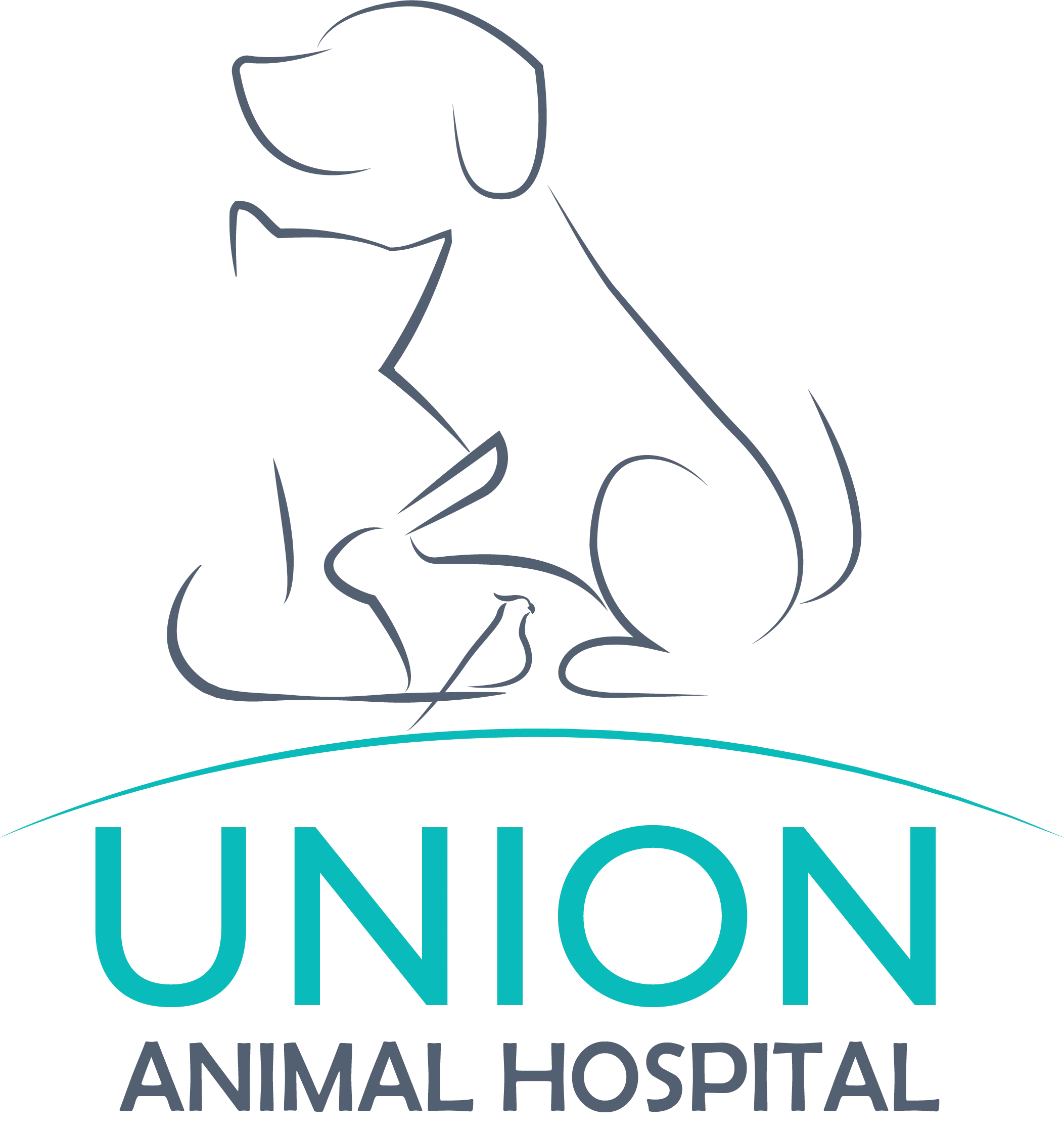General Anesthesia at Union Animal Hospital
Anesthesia plays a crucial role in ensuring the successful completion of surgical and dental procedures for our patients, your beloved pets.
It's common to feel anxious about general anesthesia; however, the dangers linked to delaying necessary interventions, such as addressing dental issues, far outweigh the risks of complications from anaesthesia when administered safely.
At Union Animal Hospital, we prioritize utilising the most modern and safest anesthetic practices. Our protocols adhere to AAHA guidelines and are crafted in collaboration with certified veterinary anaesthesiologists. General anesthesia is administered only with meticulous attention and expertise, the likelihood of complications is significantly reduced when your pet has an anesthetic procedure performed at Union Animal Hospital because we tailor anesthesia protocols to each patient's specific requirements, utilizing various assessments to inform our approach. Anesthesia is not a one size fits all service and at Union Animal Hospital your pet’s anesthestic procedure will be solely based on what your pet needs not what is the most convenient or cheapest.
Pre-anesthetic evaluations are a critical step in determining the most appropriate protocol for our patients. Through thorough assessments, including examinations, blood tests, and other necessary evaluations, combined with the use of modern anesthetic agents and monitoring equipment, help to ensure the utmost safety and care for your pet during their procedure Our vigilant monitoring, which is far more akin to the monitoring performed at top universities and specialty facilities than most general practices or low cost service providers, enables early intervention if any concerning signs arise, ensuring your pet's well-being throughout the procedure.
Thanks to our comprehensive anesthesia approach, our patients typically recover quickly, often waking up and standing within 15-20 minutes post-procedure, and returning home the same day. While no anesthesia outcome can be guaranteed, rest assured that the veterinarians and staff at Union Animal Hospital are extensively trained to deliver safe anesthesia and minimise any potential risks or discomfort for your pet.
Preanesthetic Testing and You, The Pet OwnerPre-anesthetic blood testing is always recommended for any pet undergoing a general anesthesia procedure, regardless of age, prior experiences, or testing history. In certain cases, advanced testing like radiographs, echocardiograms, ultrasounds, or specialized blood tests may be necessary or advised. Some pets might require supportive care, such as hospitalization before a procedure, especially emergency cases needing stabilization before anesthesia.
While not obligatory for all patients, conducting this testing before a procedure ensures the safety of your pet. Around 80-90% of animals may have organ issues without external symptoms, posing risks during anesthesia. Without pre-anesthetic blood tests checking liver and kidney values, white and red blood cell counts, critical health issues might go unnoticed. Pets age rapidly, making regular testing crucial, even if a previous test was normal.
We recommend a pre-anesthetic screen for all pets and suggest a comprehensive blood panel for seniors (over 7 years) or those with chronic conditions to assess more parameters. Our team will discuss testing options during the consultation for you to make an informed decision.
While we don't mandate testing for all patients this is only due to the added cost associated with testing and not because it is unecessary. Preanesthetic testing is highly encouraged for the safety of your pet before any anesthesia is administered, regardless of age or perceived health status. Additional tests may be advised based on your pet's dental evaluation and existing health conditions. Your pet's well-being is our top priority, and although we support informed decisions, additional testing might be necessary for certain procedures to ensure your pet's health and safety.
Many of these tests can be completed the morning of your pet’s procedure in our state of the art in house laboratory. Some may require more time and preparation in advance but we will discuss these with your at your pets pre surgical consultation or examination.
How We Improve Your Pet's Anesthetic Experience
Anesthetic Patient Care and Monitoring
In our office, each patient's anesthesia is tailored to their specific health requirements. The medications administered to your pet are carefully selected based on their health condition and the procedure at hand. We take every precaution to ensure that your pet's experience is safe, pain-free, and as stress-free as possible.
During every procedure, both a licensed veterinary technician and the doctor closely monitor your pet with an assistant available to aid them if necessary. Utilizing advanced monitoring equipment, along with direct observation and assessment, we strive to make your pet's anesthetic procedure as safe as possible. Having two-three individuals overseeing every aspect of your pet's care enables us to promptly identify and address any issues that may arise.
Every patient receives a pre-anesthetic medication customized to their needs, serving as both a sedative and a systemic pain reliever. This approach minimizes the amount of anesthetic required for the procedure, promotes relaxation in your pet while in our care, and reduces the likelihood of complications during anesthesia.
Prior to undergoing anesthesia, all patients receive pre-oxygenation to optimize oxygen levels in their system. This involves the use of an oxygen mask and direct oxygen therapy for 5-10 minutes, ensuring adequate oxygen supply during general anesthesia. Once under anesthesia, a cuffed endotracheal tube is gently inserted into the airway, allowing for the safe delivery of gas anesthesia and oxygen. This tube also facilitates ventilation and protects the airway from aspiration throughout the procedure.
Patients under general anesthesia have an IV catheter placed for fluid therapy and medication administration. This not only allows for the easy delivery of essential medications and anesthetic agents but also helps maintain hydration and blood pressure levels for optimal organ function. The IV catheter remains in place until your pet is fully alert, enabling post-operative medication administration if necessary.
State-of-the-art monitoring equipment is utilized to track vital parameters such as respiration rate, heart rate, blood pressure, ECG readings, carbon dioxide levels, oxygen saturation, mucous membrane color, anesthesia depth, and body temperature. These parameters are recorded approximately every 5 minutes for reference and future analysis. Any changes in anesthesia, medication administration, or fluid rates are meticulously documented for ongoing care.
Our vigilant monitoring allows for the swift administration of life-saving or corrective medications should there be any concerning changes in your pet's vital signs. This proactive approach helps address any issues promptly, preventing potential complications from developing.
Cardiac Disease and Anesthesia
In our practice, we routinely administer anesthesia to pets with heart disease, also known as cardiac disease, who are considered high-risk cases. It is recommended that pets with cardiac disease or murmurs undergo a comprehensive cardiac evaluation before undergoing any anesthesia to thoroughly evaluate their cardiac function. Typically, this evaluation includes blood pressure measurements, specialized blood testing and cardiac imaging to provide a detailed assessment of their heart performance. We have access to specialized medications and procedures designed for pets undergoing anesthesia to mitigate the risks associated with underlying heart conditions. During your consultation or examination, we will thoroughly discuss these tailored options with you.
Pain Control
During anesthesia, the body remains susceptible to pain despite the induced state of unconsciousness. Even though your pet is asleep, their pain receptors remain active. If pain stimuli occur, your pet's cardiovascular system reacts, potentially affecting heart rate, respiration rate, and blood pressure. These physiological responses can strain your pet's cardiovascular health, escalating the likelihood of anesthetic complications.
In our practice, all animals undergoing anesthesia receive systemic pain relief to mitigate discomfort during procedures. Moreover, when feasible, local anesthetics are administered to further numb specific areas. Our objective is to suppress these pain receptors effectively, ensuring your pet's body remains insensate to pain. By achieving this, we aim to minimize the requirement for anesthetic drugs, thus enhancing the safety profile of the anesthesia process.
Body Temperature
Anesthesia will affect your pet's capability to regulate body temperature. In our practice, we employ dedicated and safe patient warming equipment, such as Bair Huggers, circulating water pads and intravenous fluid warmers to maintain optimal warmth for your pet throughout their procedure and during their recovery. These warming devices remain in use until your pet fully recovers and reaches a normal body temperature.
Recovery
Recovery is just as important as the anesthetic procedure itself. That is why you will find your pet is under the direct observation of trained assistants, technicians and veterinarians throughout their entire stay at Union Animal Hospital. Your pet will recovery in our centralized recovery room with personal warming devices until they are able to regulate their own body temperature and stand unassisted. Our team will ensure they remain relaxed, warm and pain free until it is safe for them to be released to you.
At Union Animal Hospital our procedures are designed to allow your pet to spend no less than three hours with us in their recovery phase, this substantially reduces complications in the recovery period and the post recovery period, when they are home with you. In the event your pet's procedure has to be done later in the day and your pet can't be safely released to home our team will guide you through the process of having your pet transferred to a local after hours facility to complete their recovery.



